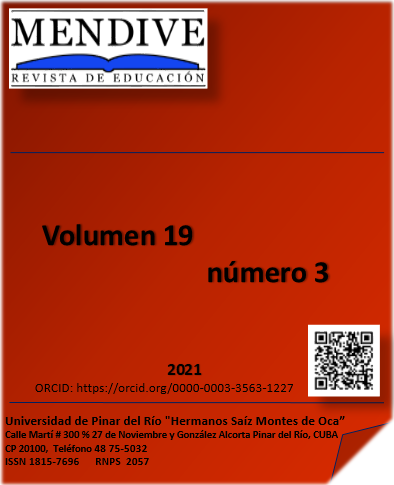Glosario de frases idiomáticas. Su impacto en la motivación y la expresión oral en inglés/Glossary of idioms. Its impact on motivation and speaking skill in English
Contenido principal del artículo
Resumen
Descargas
Detalles del artículo
Citas
Al-Houti, Sh. K. & Aldaihani, S.M. (2018). Letting the Cat out of the Bag: EFL College Students´ Attitudes towards Learning English Idioms. International Journal of Higher Education, 7(1), pp. 140 150. https://www.sciedupress.com/ijhe
Alrabai, F. (2016). The Effects of Teachers´ In-Class Motivational Intervention on Learners´ EFL Achievement. Applied Linguistics, 37(3), 307-333. https://academic.oup.com/applij/article-abstract/37/3/307/1741531?redirectedFrom=fulltext
Cooper, Th. (2008). Teaching Idioms. Foreign Language Annals, 31(2), pp. 255- 266. https://doi.org/10.1111/j.1944-9720.1998.tb00572.x
Ghani, M. & Azhar, S.W. (2017). Effect of Motivation, Willingness to Communicate (WTC), Self-Perceived Communicative Competence (SPCC) and L2 Anxiety on the Frequency of Use of English as L2. Journal of Educational Research, 20(1), pp. 157 -171. https://www.prdb.pk/article/effect-of-motivation-willingness-to-communicate-wtc-self-7342
González, D. (Ed.). (1995). Teoría de la motivación y la práctica profesional. Ciudad de la Habana: Editorial Pueblo y Educación.
Jang, H.; Kim, EJ. & Reeve, J. (2016).Why students become more engaged or more disengaged during the semester: A self-determination theory dual-process model. Learning and Instruction, 1(43), pp. 27-38. https://doi.org/10.1016/j.learninstruc.01.002
Lee, T., Gardner, D., & Lau, K. (2020). The effects of L2 motivational strategies: within and beyond the L2 classroom. Innovation in Language Learning and Teaching, 14(5), 451-465. https://doi.org/10.1080/17501229.2019.1620240
Lee, T.,& Lin, S. (2019). English teachers´uses of motivational strategies beyond an established framework. Educational Research, 61(4), 451-468. https://doi.org/10.1080/00131881.2019.1677170
Li, H. (2020). Motivational Strategies in English as Foreign Language Teaching: a research review. Equity and Access for Language Learners, 17(1), pp. 137-154. https://doi.org/10.18060/24393
Reeve, J.; Ryan, R.; & Deci, E. (2018). Sociocultural inûuences on student motivation as viewed through the lens of self-determination theory. In G.Liem, & D. McInerney (Eds.). Big theories revisited 2 (pp. 3160). Charlotte, NC: IAP.
Rhonbi, Z. & Sadeghi, K.(2017). Improving English Language Learners´ Idiomatic Competence: Mode of Teaching Play a Role? Iranian Journal of Language Teaching Research, 5(3), pp. 61-79. https://eric.ed.gov/?id=EJ1156202
Roberto De Caro, E. (2009). The Advantages and Importance of Learning and Using Idioms in English. Cuadernos de Lingüística Hispánica, (14), julio-diciembre, 2009, pp. 121-136 Universidad Pedagógica y Tecnológica de Colombia Tunja-Boyacá, Colombia
Ryan, R. & Deci, E. (2020). Intrinsic and extrinsic motivation from a self-determination theory perspective. Contemporary Educational Psychology, 61, https://doi.org/10.1016/j.cedpsych.2020.101860
Saracho, M. (2014) ¿Te echo una mano con las expresiones idiomáticas? En N. Contreras (ed.). La Enseñanza del español como LE/L2 en el siglo XXI. (pp. 639-652). ASELE
Tarvin, L. (2014). Communicative Competence: Its Definition, Connection to Teaching and Relationship with Interactional Competence. University of Missouri: USA. https://doi.org/10.13140/RG.2.1.3214.2807
Vallejo, G. (2011) El aprendizaje desde la perspectiva de la motivación profesional y las actitudes. MEDISAN (online), 15(3), pp. 363-368. Disponible en: http://bvs.sld.cu/revistas/san/vol_15_3_11/san14311.htm
Wlodkowski, R. (2003). Fostering Motivation In Professional Development Programs. New Directions for Adult and Continuing Education, (98), pp.39 -48. https://doi.org/10.1002/ace.98
Yi, G. (2019). Teaching English Idioms to Chinese EFL Learners: A Cognitive Linguistic Perspective. English Language Teaching, 12(5), pp. 145 155. https://www.ccsenet.org/journal/index.php/elt/article/view/0/39170
You, C. & Dörnyei, Z. (2016). Language Learning Motivation in China. Results of a Large-Scale Stratified Survey. Applied Linguistics, 37(4), pp.495-519. https://academic.oup.com/applij/article-abstract/37/4/495/1742097
Zarrinabadi, N.; Mantou, N. & Shirrzad, M. (2021).Autonomy support predicts language mindsets: Implications for developing communicative competence and willingness to communicate in EFL classrooms. Learning and Individual Differences, 86. https://doi.org/10.1016/j.lindif.2021.101981


